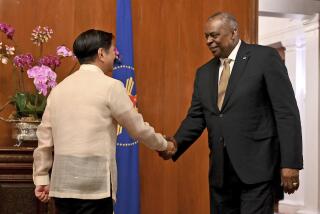Keep U.S. Bases, Say Filipinos--as Good Sports?
- Share via
MANILA — Despite some aggressive opposition to the two large U.S. military bases on Luzon, Philippines opinion surveys still show widespread support for their retention.
One of the more outspoken opponents, an American-educated constitutional lawyer and university president, said wryly that there was at least one silver lining: “It seems that we shall be able to watch the World Series live on television for quite some time to come,” referring to the telecast intended for American servicemen on the bases but picked up via special antennae by thousands of Filipinos.
While there has been vociferous opposition from the political left, joined increasingly by middle-class nationalists, political figures and the mass media, a 1988 nationwide survey showed that 42% of respondents and 57% of those who were aware of the presence of the bases wished them to remain beyond the expiration of the present agreement in 1991.
A more recent survey, released this spring, confirms the earlier finding: 40% of respondents--and 62% of those aware--favor retaining the bases indefinitely. The most common reason given is national security, followed by the jobs they provide and other assistance provided by the United States.
Support for the bases is strong, therefore; but it could be a mistake to call it valid. Side by side with the 40% who wish the bases to remain are 35% who are not aware of the bases and another 6% who are undecided.
More important, perhaps, support for the bases may well be part of a general Filipino pattern of acquiescence and approval, both of authority figures and of the current arrangement of society. This is a pattern found particularly among the poor and the less-educated. These groups, more than others, claim to be satisfied both with President Corazon Aquino and with Salvador Laurel, her estranged vice president, also satisfied with other officials and with the law courts; they disapprove of land occupation by the poor and they support the bases.
A believer in conspiracy theory might argue from this that there is a deliberate strategy to “keep them poor and ignorant, and they will be docile.” Certainly there is no indication of a revolutionary mood.
Yet retention of the bases may intensify an inherently unstable situation. The argument that the bases are necessary for national security will lose force if relaxation of East-West tensions continue. The counterargument, favored by those who oppose the bases as a source of American interference in Philippine affairs, could strike a nationalistic chord among the masses. And the survey indicates that Aquino’s own popularity has declined somewhat in the past six months as a consequence of her inability to stop the perceived decline in living standards.
The bases issue will probably become extremely divisive in the coming months. To add fuel to the flames, the communist-led New Peoples’ Army (NPA) recently offered a cease-fire if the president would promise to close the bases in 1991. The ambush-killing April 21 of U.S. Army Col. James N. Rowe may represent an attempt by the NPA to preempt the issue and identify itself with the cause of Philippine nationalism, and its enemy as the “foreign imperialist.” The slaying may also have been an NPA attempt to provoke more American intervention for the same purpose, as well as to slow foreign investment and the steady improvement of the Philippine economy.
Meanwhile, Aquino has indicated that she expects the next stage of talks on the bases to begin by the end of the year--talks that could lead either to negotiation of a new agreement or to a decision to close the bases in 1991. She is likely to go along with groups open to a renewal of the bases contract, in the hope of thereby assuring more desperately needed economic assistance. She will be backed by the amorphous political party led by her brother, Jose Cojuangco, a member of Congress, and by Speaker Ramon Mitra, along with others in the House of Representatives.
Opposition will come in all probability from the Senate, which normally must ratify any new treaty and has already gone on record as opposed to the presence of nuclear weapons on Philippine soil. The Senate includes a number of potential candidates to succeed Aquino in 1992, notably Senate President Jovito Salonga and Sen. Aquilino Pimentel; each heads a political party that has taken an anti-bases stand.
On the surface, Senate opposition would appear to doom any new agreement. But the constitution provides that the matter may be subjected to the national electorate, in a referendum, if Congress so decides. That could be a losing battle, lining up nationalists, opposition parties, many cause-oriented groups--together with the NPA and its front organizations--against Aquino and the pro-base forces, possibly supported by the military. At this point, one can only guess that, in the eyes of the poor majority, economic considerations will dictate retention of the bases.
Yet such an outcome, based on sheer economic necessity, means the American bases in the Philippines would rest on foundations of sand. But given a more comprehensive approach on the part of the Americans, combining a deep respect for nationalist sensibilities with measures that would help to improve living standards, Filipinos could well decide that they prefer the World Series live after all.
More to Read
Sign up for Essential California
The most important California stories and recommendations in your inbox every morning.
You may occasionally receive promotional content from the Los Angeles Times.













